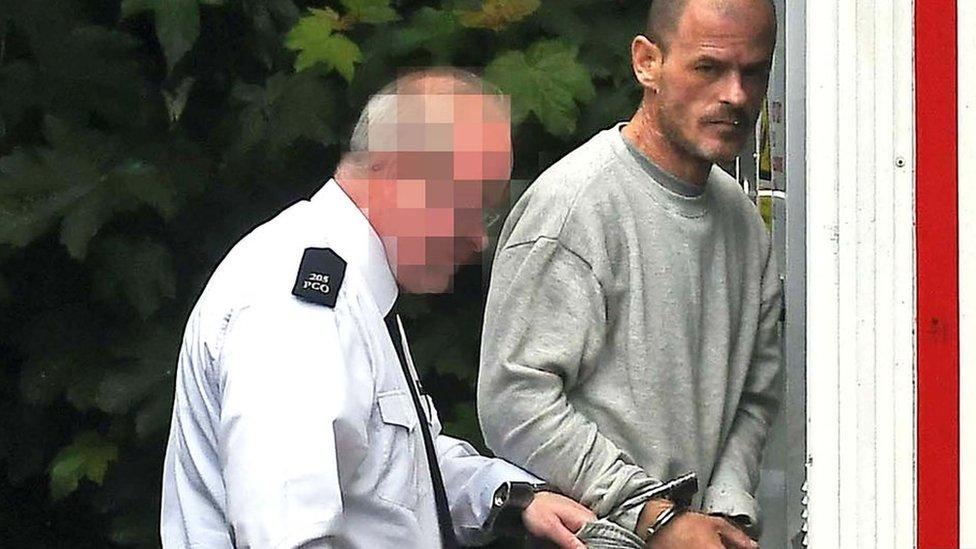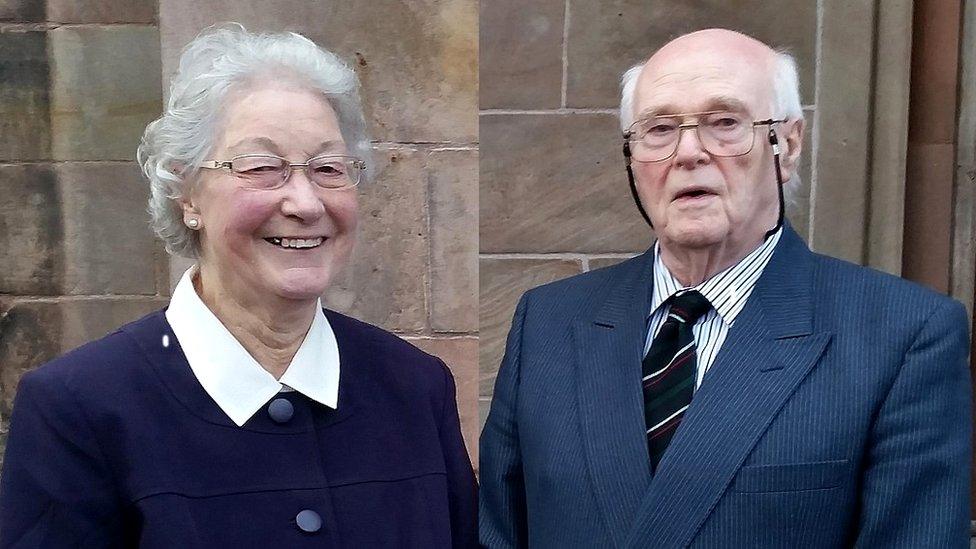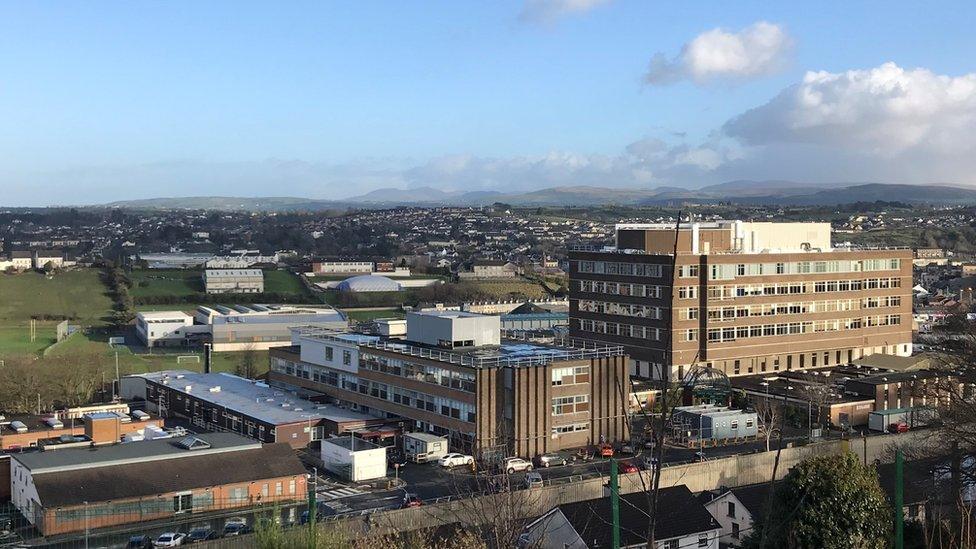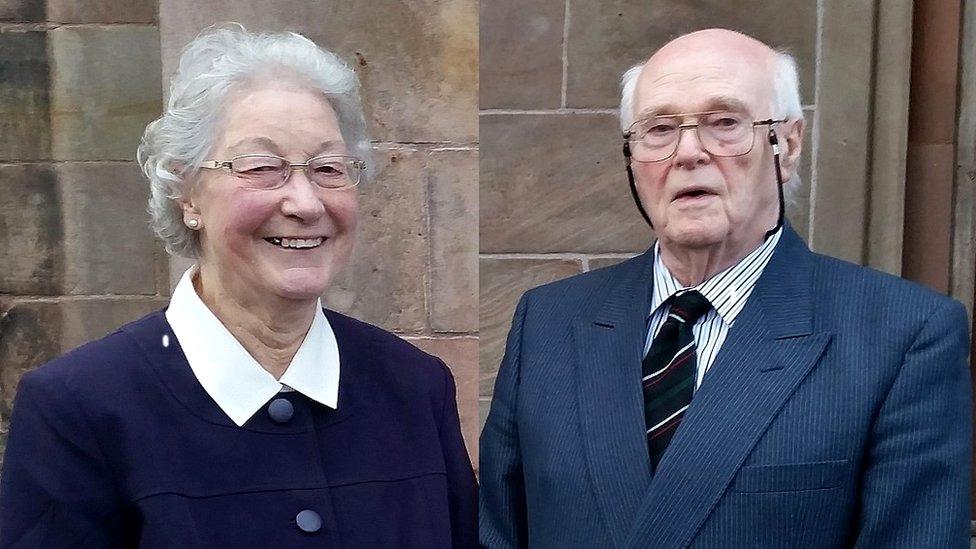Cawdery inquest: Police 'should have arrested killer' hours before fatal attack
- Published

Thomas Scott McEntee at an earlier court hearing
An inquest in to the deaths of an elderly couple has heard suggestions police should have arrested their killer hours before he attacked them.
A police constable said that on the day of the killings he and his partner were tasked to search for a naked man in the vicinity of Daisy Hill Hospital, Newry.
That man, Thomas Scott McEntee, later killed Michael and Marjorie Cawdery in their Portadown home on 26 May 2017.
McEntee is serving a minimum of 10 years in jail for their manslaughter.
In his statement, Police Service of Northern Ireland (PSNI) Constable Kenmure, from Newtownhamilton station, said he arrived on the scene at Hospital Road in Newry as colleagues were restraining McEntee, who was naked.
The inquest has previously heard that another police officer punched McEntee in order to restrain him.
"Three female staff from the hospital's mental health department came to talk to him," Constable Kenmure said on Monday, day six of the inquest.
"One had his clothes. He was passive and his eyes were closed.
"I stayed with him as a paramedic dressed his wounds. I overheard a paramedic and one of the mental health staff say they were going to Craigavon [Area Hospital]."
'You should have arrested him'
Constable Kenmure told the inquest that he and his partner, Constable McDermott, drove behind in their car.
"When we got to Craigavon we spoke to the paramedic," he said. "Mr McEntee was dressed by this stage. We got back into the car and the paramedic said they needed no further assistance."
A short time later, McEntee got up from the waiting area of Craigavon's emergency department and left the hospital grounds before ending up in the Cawderys' home.

Marjorie and Michael Cawdery were killed in a stabbing at their home in Portadown in 2017
It was put to Constable Kenmure that police should have done more.
"You should have arrested him under Article 130," barrister Thomas Fitzpatrick said.
"If you invoke 130 then you must take him to a place of safety. An ambulance isn't a place of safety.
"The ambulance didn't have all they information so they couldn't have passed it on. You said you deferred to the mental health staff but you didn't ask them if it was safe to release him."
When asked by Coroner Maria Dougan if he had had knowledge of the later consequences, would he have used Article 130, the constable said: "Yes."
Constable Kenmure later added: "It was my belief that what I did was right, but it's tough to think you could have changed things. I think about it often. But obviously it's not about me."
'Our concern was our patient'
Paramedics Patrick Rooney and Ryan Morgan were also called to give evidence to the inquest on Monday.
Mr Rooney had been driving the ambulance that morning and said he had been in the Portadown area when he and his colleague were tasked to the scene at Daisy Hill.

McEntee was restrained by police outside Newry's Daisy Hill Hospital (above) before being taken to Craigavon Area Hospital
He told the coroner that they had not received full details of the incident that had preceded their arrival. This included a police officer punching McEntee twice after he took on a "fight pose".
"Generally, police would volunteer that information. Obviously he was naked, which I'd say is an arrestable offence. But our concern was our patient," Mr Rooney said.
It was stated that following discussion between police and Mr Rooney's colleague Ryan Morgan, it was agreed that rather than travel in the rear of the ambulance, police would follow behind the vehicle.
Regarding the decision for police to follow, rather than travel in an ambulance containing someone who remained a voluntary patient, Mr Rooney said: "It does happen. It was sort of a dynamic decision from the scene."
He added: "My belief was he was going voluntarily but there was risk he may try to abscond.
"It'd have been my expectation that they'd have stayed [at the hospital] until they got clarification from the [emergency] department.
"I didn't see them leave. We are always going to stay with a patient until cleared by staff."
When asked by counsel for the coroner Steven McQuitty if more information from the police "would have been helpful" Mr Rooney replied: "Very much so."
'It's not my authority to tell police they can go'
Mr Rooney's paramedic colleague Ryan Morgan told the court that upon arrival at Hospital Road, police officers walked with McEntee to the rear of the ambulance.
Mr Morgan said he dressed McEntee's injuries and that he was compliant. His handcuffs were first loosened and then removed.
The paramedic said he spoke to the mental health staff who were there and a decision was taken to transport McEntee to Craigavon Area Hospital.
"As far as I was aware he was handcuffed for being naked in a public place," he said. "I know there was apparent self-harm but I don't know if he did this to himself. He agreed to get treatment.
"He would have been asked if he wanted to go to hospital and he said yes. He said he wasn't going to run off," Mr Morgan explained.
"You take things with a healthy pinch of salt - hence, the police following behind. They were in sight and I can hit an emergency strip or alert my colleague."
When asked if he had told police they could leave the emergency department after arrival at Craigavon Area Hospital, Mr Morgan said: "It's not my authority to tell police they can go."
Asked if full knowledge of McEntee's behaviour would have changed how he approached the incident, Mr Morgan said he would not have travelled in the rear of the ambulance alone.
He added that he would have passed this information on to colleagues at Craigavon Area Hospital and he would have expected police to stay with McEntee in the emergency department.
- Published16 June 2023

- Published12 June 2023

- Published14 June 2023

- Published28 June 2018

- Published22 June 2018
